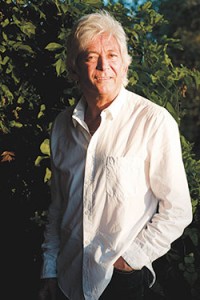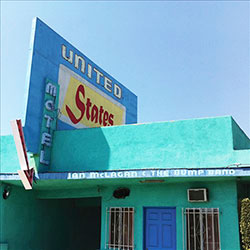
Ian McLagan, will be performing at Johnny D’s on October 22.
By Blake Maddux
As a member of the band Small Faces, Ian McLagan played keyboards on 11 songs that made the top 40 in the United Kingdom between 1966 and 1969. Only one of these tunes, 1968’s Itchycoo Park, enjoyed similar success in the United States. It would land in the UK top 10 for a second time upon its reissue in 1975.
When lead singer Steve Marriott left the band in 1969, McLagan, bassist Ronnie Lane, and drummer Kenney Jones welcomed Rod Stewart and Ron Wood as replacements on vocals and guitar, respectively.
Given the new additions’ advantage in terms of height, the new line-up could no longer be accurately described as “small” and called itself Faces. More or less abandoning the R&B-influenced, sometimes psychedelic pop of the first group, Faces recorded unrefined, rough-around-the-edges rock ‘n’ roll with Stewart’s gravelly voice as the focal point.
This band would enjoy greater commercial success in America than Small Faces did, undoubtedly aided by the parallel solo career that Stewart was pursuing. In 1975, when Wood joined The Rolling Stones on tour and Stewart was on the cusp of becoming a bona fide superstar under his own name, Faces disbanded.

Ian McLagan’s latest album, “United States.”
Since then, Ian “Mac” McLagan has built a résumé that anyone who wants to make music one’s life and career should aspire to approximate. Having himself toured and recorded with The Rolling Stones in the late 1970s and joined Billy Bragg’s group in 1997, he has also played on albums by – among many others – Chuck Berry, Bonnie Raitt, Bruce Springsteen, Melissa Etheridge, Buddy Guy, Bob Dylan, Robyn Hitchcock, Paul Westerberg, Frank Black, Ryan Adams, and Lucinda Williams.
As a solo artist and leader of the Bump Band, he has released several albums of his own since 1979, including this year’s United States.
Oh yeah, he is also the author of the memoir All The Rage: My High Life with the Small Faces, the Faces, the Rolling Stones and Many More. And he appeared in the 2012 Judd Apatow movie This Is 40.
Having just run through the door after grocery shopping, McLagan spoke to The Somerville Times by phone from his home in Austin, Texas.
Somerville Times: How long have you lived in Austin, Texas?
Ian McLagan: 20 years.
ST: And before that you lived in Los Angeles.
IM: 16 years, yeah.
ST: Wow, so you have been in the United States for 36 years?
IM: That’s right, more than I ever spent in England. It’s odd to think, isn’t it? I should have an [American] accent by now. I don’t know what happened!
ST: Is there anything about the United States that you will probably never embrace or get accustomed to?
IM: There are some things that are just particularly American. I mean, I don’t like American bacon, but there’s a great market here where I can get Irish bacon and English bangers. I don’t get mac ‘n’ cheese. That is so boring! Nobody would cook that for you in England. So many [American] restaurants have that as a dish. I can’t be-lieeeeve it! There’s actually one called “Ian’s Mac ‘n’ Cheese.”
ST: So it has both of your names in it!
IM: Yeah, I know!
ST: What about the George Bernard Shaw quote, “England and America are two countries separated by a common language”?
IM: Oh yeah! I still spell “color” with o-u. I say “to-MAY-to,” but I always think “to-MAH-to.” I was over in England a couple of years ago, and I’m ordering breakfast and I said, “I’ll have to-MAY-toes with that,” and I couldn’t believe I said it! Because I think “to-MAH-to” and I twist it to say “to-MAY-to.” That morning I must have twisted it and twisted it again. I don’t know!
ST: Would you say that Austin, Texas, is as fertile and exciting as any other music scene that you have ever known?
IM: I’d say possibly New York might give it a run for its money. What’s great about Austin is that there is every kind of music from African, punk, rap, blues, country, soul, rock ‘n’ roll, singer-songwriter. It’s all here. London doesn’t have the music scene we have here. L.A. certainly doesn’t. Nashville doesn’t. Memphis doesn’t. Chicago and New York, maybe, come close. Let’s face it, New York’s got everything going.
ST: Have you always been called “Mac”?
IM: Yeah, since I was very young. My dad was Mac, my brother’s Mac. His name is Michael. He calls me Ian, I call him Michael. His sons and all that family call me Ian. They’re the only people on the planet apart from complete strangers [who call me Ian]. And I said to him one day, “Let’s both be Mac, for Christ’s sake. It’s stupid!” He said, “Alright Ian.” I said, “Alright Michael … Forget it!” (laughs)
My mum was Mrs. Mac. Anyone in England, Scotland, Ireland, Wales with Mac in their name is called Mac, mostly. Paul McCartney’s from Liverpool, everyone calls him “Macca.” It’s the local version.
ST: It takes a lot for an album, no matter how great it is, to stand out among the classic masterpieces of the late 1960s. Are you proud that the Small Faces album Ogden’s Nut Gone Flake does?
IM: We were all very proud of it. Looking back, it’s a shame we didn’t spend more time and make it a whole album as the story of Happiness Stan [the subject of the six-song suite that made up the record’s second side]. These were innocent times.
ST: Was there a personal or professional connection between Small Faces and the Jeff Beck Group, with whom Faces members Rod Stewart and Ron Wood played?
IM: We’d met Ron at Steve [Marriott]’s house. We knew him and got on with him very well. After Steve left, as soon as he quit, Ronnie [Wood] called [Small Faces bassist] Ronnie Lane up to see how we were doing and what we were going to do. So they got together, the two of them, and then Ronnie [Lane] called me and said, “Why don’t you come over? Ronnie Wood’s here.” And so I went over and we worked on a few songs and just played for a while, and then we started doing it regularly.
We were allowed to use the [Rolling] Stones’ rehearsal studio. They had a studio but the never used it hardly. Ian Stewart – “Stu,” the [Rolling Stones’] piano player – offered it to us free of charge until we got some money, which was very, very kind because we had no money. So we rehearsed there and then eventually Ronnie Wood brought Rod down.
Ronnie Wood, Rod Stewart, me, and Steve Marriott had one very important thing in common: we all loved and knew the Muddy Waters Live at Newport album.
So when Rod come in to sing, we just went, I Feel So Good, I Got My Mojo Working, Hoochie Coochie Man, I Got My Brand On You, Tiger In A Tank. He knew ‘em and we knew ‘em, and we were instantly a band. It’s pretty lucky, you know?
I’d never actually met Rod. I’d seen him sing a few times. Ronnie [Wood] we knew. Rod was a mystery to us. And also when we first started, because Steve had quit the band, we thought, let’s not get a lead singer – we’ll all sing. We’d been doing that, but it wasn’t great, and as soon as Rod started singing, we went, “Oh, wait a minute: WE NEED A SINGER. We need this guy.”
ST: What do you make of the fact that the bands that you have been in have been cited as influences on genres as varied as punk (The Sex Pistols), mod revival (The Jam), alternative (The Replacements), Britpop (Blur, Supergrass) and back-to-basics rock ‘n’ roll (The Black Crowes)?
IM: Glen Matlock [bassist for The Sex Pistols] was a fan of The Small Faces and then became a fan of the Faces. [The Jam’s lead singer] Paul Weller is a dear pal. He’s a lovely guy. Chris [Robinson, lead singer of the Black Crowes] and I are friends. I’ve actually sat in with the band a couple of times. He’s always been on the backburner, as far as I’m concerned, as a replacement for Rod over the years. But we’re going to tour with Rod, if things work out, next year. That’s the plan, yeah. It looks like it might [happen].
ST: I was going to ask you about that by sort of hiding it inside of another question.
IM: That’s the question that everybody asks! They’re kind of sheepish: “Well, I’ve got one question…” “The answer’s yes.” “Wait, you don’t know the question yet.” I’m like, “Yeah I do.” (laughs)
ST: Did you feel honored to have been inducted into the Rock and Roll Hall of Fame?
IM: Yeah, it meant a lot to me. As the years went by, I thought, “Oh, were not gonna get in.” But we did! It’s a nice feeling. And it’s mentioned quite often, it’s like a knighthood. The funny thing is, in England, it means absolutely nothing. They just don’t care about it, they don’t think about it. I don’t know if there’s an English Rock and Roll Hall of Fame, but I’m certainly not in it if there is one.
ST: Is there any deeper meaning to United States, the seemingly simple title of your latest album with the Bump Band?
IM: It’s not about America, it’s about states of unison, really. You know, it’s about relationships. And I’m surprised no one’s used it before, but then, I suppose, there’s a good reason, ‘cause when you Google it you get United States Post Office, United States government, United States everything but me!
Ian McLagan and Jon Notarthomas, with Corin Ashley, at Johnny D’s on Wednesday, October 22, 7:30 p.m. (Doors at 5:30 p.m.)












Reader Comments